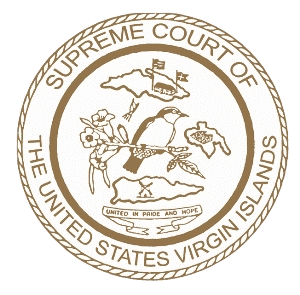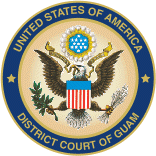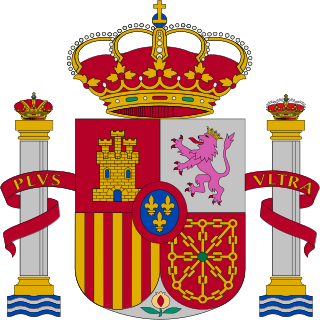Related Research Articles

The United States Virgin Islands, officially the Virgin Islands of the United States, are a group of Caribbean islands and a territory of the United States. The islands are geographically part of the Virgin Islands archipelago and are located in the Leeward Islands of the Lesser Antilles. The islands have a tropical climate.

Politics of the United States Virgin Islands takes place in a framework of a presidential representative democratic dependency, whereby the governor is the head of the territory's government, and of a multi-party system. United States Virgin Islands are an unincorporated and organized territory of the United States, administered by the Office of Insular Affairs of the United States Department of the Interior. Executive power is exercised by the local government of the Virgin Islands. The judiciary is independent of the executive and the legislature.
In common law systems, a superior court is a court of general jurisdiction over civil and criminal legal cases. A superior court is "superior" in relation to a court with limited jurisdiction, which is restricted to civil cases involving monetary amounts with a specific limit, or criminal cases involving offenses of a less serious nature. A superior court may hear appeals from lower courts. For courts of general jurisdiction in civil law system, see ordinary court.
The court system of Canada is made up of many courts differing in levels of legal superiority and separated by jurisdiction. In the courts, the judiciary interpret and apply the law of Canada. Some of the courts are federal in nature, while others are provincial or territorial.
The Superior Court is the state court in the U.S. state of New Jersey, with statewide trial and appellate jurisdiction. The New Jersey Constitution of 1947 establishes the power of the New Jersey courts: under Article Six of the State Constitution, "judicial power shall be vested in a Supreme Court, a Superior Court, and other courts of limited jurisdiction." The Superior Court has three divisions: the Law Division which is the main trial court for cases of civil or criminal law, the Chancery Division, which tries equity law cases, and the Appellate Division, which is the intermediate appellate court in New Jersey. "Appeals may be taken to the Appellate Division of the Superior Court from the law and chancery divisions of the Superior Court and in such other causes as may be provided by law." Each division of the Superior Court is divided into various Parts."

The Legislature of the Virgin Islands is the territorial legislature of the United States Virgin Islands. The legislative branch of the unincorporated U.S. territory is unicameral, with a single house consisting of 15 senators, elected to two-year terms without term limits. The legislature meets in Charlotte Amalie on the island of St. Thomas.
A judicial commissioner is person appointed on a non-permanent basis to a judicial office. In some countries, such as Malaysia and Singapore, judicial commissioners have the powers of full judges. In other jurisdictions their powers are limited.

The Supreme Court of the Virgin Islands is the highest court in the territory of the United States Virgin Islands. The Supreme Court assumed jurisdiction over all appeals from the Superior Court of the Virgin Islands, a trial level court, on January 29, 2007. The Supreme Court currently consists of a Chief Justice and three associate justices, but up to four associate justices may be appointed. Supreme Court justices are each appointed by the Governor and confirmed by the Legislature for a ten-year term. There is no intermediate court of appeals, and the Supreme Court does not have discretion in hearing appeals. Appeals of Supreme Court decisions were heard by writ of certiorari by the United States Court of Appeals for the Third Circuit until December 29, 2012, but since then they have been heard by the Supreme Court of the United States in Washington, DC.

The state government of Georgia is the U.S. state governmental body established by the Georgia State Constitution. It is a republican form of government with three branches: the legislature, executive, and judiciary. Through a system of separation of powers or "checks and balances", each of these branches has some authority to act on its own, some authority to regulate the other two branches, and has some of its own authority, in turn, regulated by the other branches. The seat of government for Georgia is located in Atlanta.

The District Court of Guam is a United States territorial court with jurisdiction over the United States territory of Guam. It sits in the capital, Hagåtña. Appeals of the court's decisions are taken to the United States Court of Appeals for the Ninth Circuit. It is not an Article III court, and therefore its judges do not have life tenure, but are appointed to ten-year terms.

The District Court of the Virgin Islands is a United States territorial court with jurisdiction over federal and diversity actions in the United States Virgin Islands, a United States territory and more specifically an insular area that is an unincorporated organized territory. The court sits in both St. Croix and St. Thomas. Unlike their counterparts on other United States district courts, judges on the District Court of the Virgin Islands do not have life tenure, as the court is not an Article III court. Instead, the court is an Article IV court, created pursuant to Congress's Article IV, Section 3 powers. Judges serve for terms of ten years at a time, and until a successor is chosen and qualified. Appeals of the court's decisions are taken to the United States Court of Appeals for the Third Circuit in Philadelphia.
The Government of Guam (GovGuam) is a presidential representative democratic system, whereby the president is the head of state and the governor is head of government, and of a multi-party system. Guam is an organized, unincorporated territory of the United States with policy relations between Guam and the US under the jurisdiction of the Office of Insular Affairs.

The Judiciary of Spain consists of Courts and Tribunals, composed of judges and magistrates (Justices), who have the power to administer justice in the name of the King of Spain.

The Boston Municipal Court (BMC), officially the Boston Municipal Court Department of the Trial Court, is a department of the Trial Court of the Commonwealth of Massachusetts, United States. The court hears criminal, civil, mental health, restraining orders, and other types of cases. The court also has an appellate division which reviews questions of law that arise from civil matters filed in the eight divisions of the department.
The government of Washington State is the governmental structure of the State of Washington, United States, as established by the Constitution of the State of Washington. The executive is composed of the Governor, several other statewide elected officials and the Governor's cabinet. The Washington State Legislature consists of the House of Representatives and State Senate. The judiciary is composed of the Washington Supreme Court and lower courts. There is also local government, consisting of counties, municipalities and special districts.
The Judiciary of New Jersey comprises the New Jersey Supreme Court as the state supreme court and many lower courts.

The judiciary of British Virgin Islands is based on the judiciary of the United Kingdom. The British Virgin Islands is a member state of the Eastern Caribbean Supreme Court. The courts are organized at four levels, including the provision for final appeal to the Judicial Committee of the Privy Council in London.

Robert Anthony Molloy is the Chief United States district judge of the District Court of the Virgin Islands and former judge of the United States Virgin Islands Superior Court.

The Judiciary of Mexico, officially the Judicial Power of the Federation, is one of the three branches of government in Mexico, and the sole federal judiciary power. It is composed of the Supreme Court of Justice of the Nation, which serves as its highest court, the Federal Judiciary Council, the Federal Electoral Tribunal, regional courts, circuit and appellate collegiate courts, and district courts. In October 2024, Mexico became the only legal system in the world where its judges would be elected by popular vote.
References
- 1 2 3 "2019 US Virgin Islands Code :: Title 4 - Judiciary :: Chapter 5 - Superior Court :: § 71. Composition". Justia Law. Retrieved 2021-03-09.
- ↑ "2019 US Virgin Islands Code :: Title 4 - Judiciary :: Chapter 5 - Superior Court :: § 72. Selection, appointment, qualifications and salaries of judges". Justia Law. Retrieved 2021-03-09.
- ↑ "2019 US Virgin Islands Code :: Title 4 - Judiciary :: Chapter 5 - Superior Court :: § 73. Tenure of judges". Justia Law. Retrieved 2021-03-09.
- ↑ "Judges". Superior Court of the Virgin Islands. Retrieved 2021-03-09.
- 1 2 3 4 5 "History of the V. I. Judiciary" . Retrieved 2021-08-19.